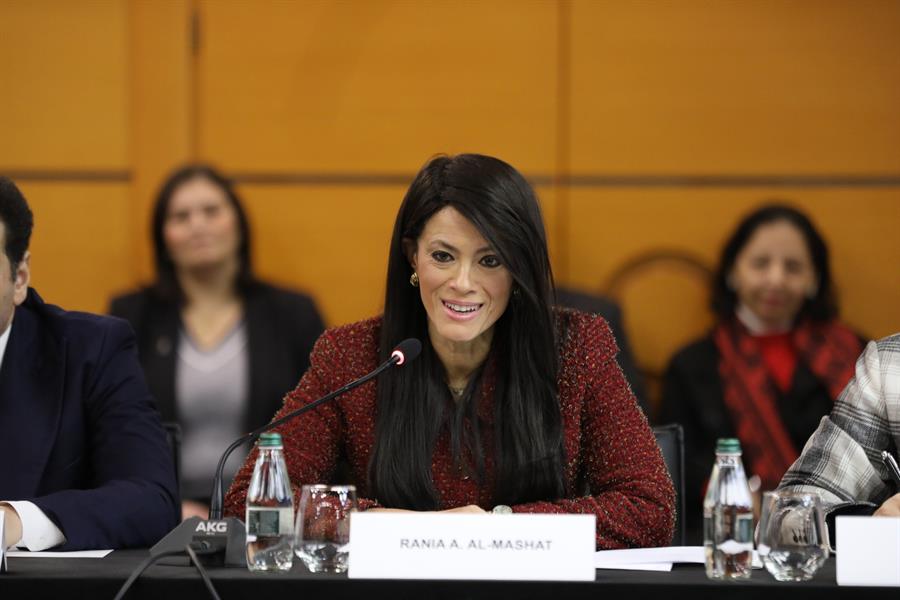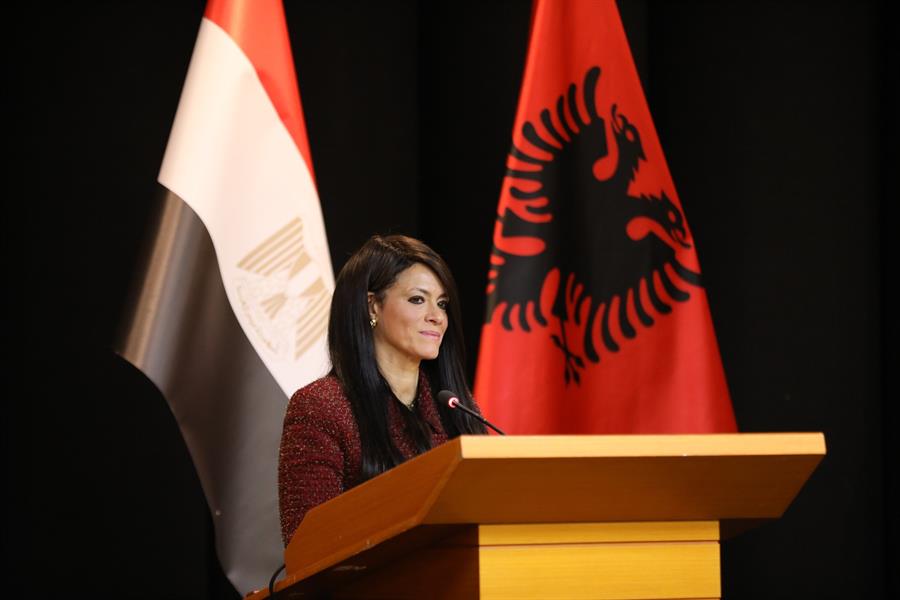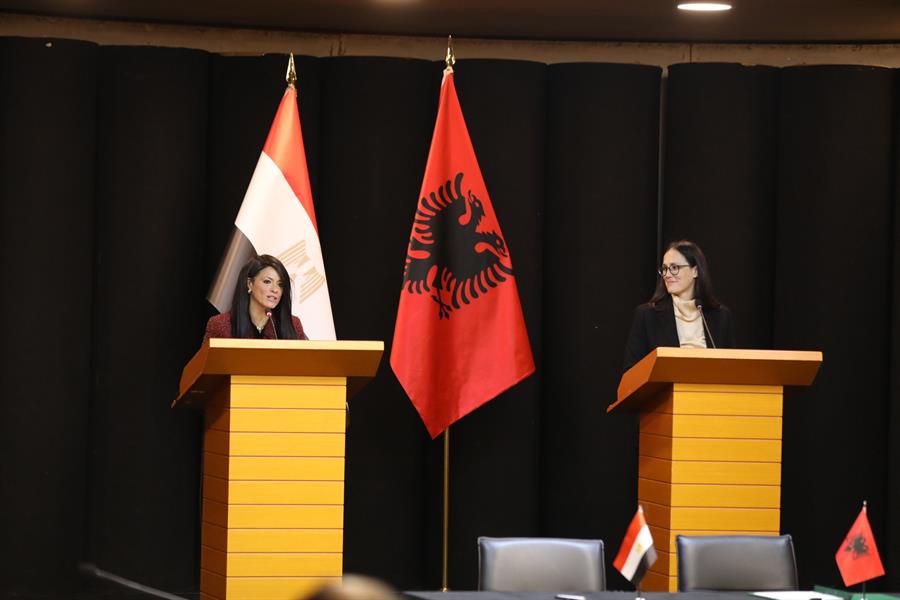Planning Minister participates in the activities of Egypt's 1st-ever climate investment forum

12 September 2023
H.E. Dr. Hala El-Said, Minister of Planning and Economic Development, participated in the activities of the First Egypt Environmental and Climate Investment forum, organized by the Ministry of Environment in partnership with the “Inclusive Green Growth in Egypt” project, which is implemented through the United Nations Industrial Development Organization.
The forum receives support from the Swiss government.
It also (The forum) witnessed the presence of H.E. Dr. Mostafa Madbouly, Prime Minister, Dr. Yasmine Fouad, Minister of Environment, Dr. Mohamed Maait, Minister of Finance, Ms. Yvonne Baumann, Swiss Ambassador to Egypt.
During her speech at the activities of the discussion session on “Investment Climate and Policies Supporting Environmental and Climate Investment in Egypt,” Dr. Hala El-Said reviewed the state’s efforts to integrate environmental and climate dimensions into sustainable development plans, as integrating environmental and climate dimensions into state plans to achieve sustainable development is a general trend for the state.
This is related to the importance that the state attaches to preserving the rights of future generations.
These efforts also come in line with the interest of Egypt and the world in the issue of protecting, sustaining, and integrating environmental systems, as work is being done to achieve this by the vision through four general goals, which are: “Facing the challenges of climate change.” “Sustainability of Natural Resources”, “Conservation of biodiversity and sustainability of ecosystems”, and “Waste Management”.
Under each goal, there is a set of targets and enabling policies necessary to achieve these targets, in addition to quantitative indicators to monitor and evaluate performance.
She noted that the state seeks to transform this strategic goal into development projects on the ground by greening the investment plan and increasing the percentage of green public investments in the plan from 40 % this year to 50% of total public investments by 24/2025.
El-Said added that, in implementing this trend, the state is keen to qualify and build the necessary capabilities to achieve these goals, by strengthening the capabilities of investment plan officials in the ministries and training them on environmental sustainability standards, to develop an executive framework for implementing the environmental sustainability standards guide launched by the Ministry of Planning and Economic Development.
The state is also working to link the levels of planning and national strategies, as the investment plan seeks to implement the National Climate Change Strategy 2050 by directing public investments to adapt and mitigate the effects of climate change, according to El-Said.
“As about EGP 410 billion are directed to mitigate and adapt to the effects of climate change in the investment 2023/22 of which 78% are directed to mitigating the effects of climate change, and 22% are directed to projects to adapt to the effects of these changes,” she said.
This trend is already being implemented through many projects in various sectors (including the expansion of the metro lines - the electric train project - the monorail - wind energy power stations in the Gulf of Suez - photovoltaic power plants - the Benban project - Al-Zaafarana - a 1.5 million rehabilitation and agriculture Acres - Establishment of seawater desalination plants, sewage networks, and tertiary treatment - Rehabilitation and renewal of the national network of canals and water channels).
El-Said pointed out that Egypt was the first country in the Middle East and North Africa to launch green bonds that focus on financing expenditures associated with environmentally friendly green projects. On the other hand, the major development initiatives implemented by the state support the country’s direction towards green transformation, most notably the Decent Life Initiative.
El-Said highlighted the launch of the “Green Village” initiative, which aims to rehabilitate the villages of the national project to develop the Egyptian countryside, “A Decent Life,” to comply with the latest global environmental standards of the World Green Building Council, and to obtain the “Tarsheed” certificate for green communities, as the initiative comes within the framework of support.
The village of "Fares" in Aswan Governorate was chosen as the first green village in the republic, according to clear criteria, and was presented as Egypt's model at the Climate Change Conference (COP27), in cooperation with the "E-Consult" engineering and environmental consulting company (project consultant), and the Egyptian Green Building Association. It is intended to qualify one village from each targeted center within the three stages of the initiative to serve as a model that can be circulated to a total of 175 villages.
El-Said also reviewed the state’s efforts to stimulate private investment in the areas of green transformation, and at the forefront of these efforts is reforming the legislative and institutional environment to create an attractive climate for local and foreign investment and provide opportunities for investment partnerships that achieve the common interests of all parties.
El-Said pointed out the implementation of the first phase of the national economic and social reform program in November 2016.
These efforts are also complemented by supporting the business environment and enhancing the role of the private sector as one of the main pillars of the national program for structural reforms in Egypt, which the state launched in April 2021 through dialogue with experts and the private sector.
The program aims to restructure the Egyptian economy to diversify the production structure by focusing on sectors of the real economy.
El-Said referred to the “State Ownership Policy” document, which explains to investors the role of the state in various sectors as a regulator of economic activity according to market mechanisms, and how the state will exit from activities in which the private sector will assume the largest role.
This document contributes to providing a fertile and stimulating environment for investment and development and aims to increase domestic and foreign investments and raise the efficiency and effectiveness of public investments.
The golden license stipulated in the Investment Law has also been activated to ensure rapid dealings with investors as well as speedy implementation of projects.
The state grants the golden license with one approval (from the Cabinet) to establish, operate, and manage projects in a period not exceeding 20 working days, as the Cabinet has already approved a large number of golden licenses in recent months.
El-Said added that in confirmation of the state’s drive for investment, the Supreme Investment Council, which was held under the chairmanship of the President on May 16, 2023, approved several decisive decisions in the investment file, which included several procedural facilities and the adoption of a package of incentives to support investment in several sectors and projects.
El-Said highlighted the establishment of the “National Council for Green Hydrogen and its Derivatives,” headed by the Prime Minister, to confirm the state’s commitment to stimulating investment in the field of green hydrogen and its derivatives, in line with the requirements of sustainable development and the state’s plans for economic and social development.
El-Said pointed out that the Cabinet approved granting several tax incentives to investment projects in the electricity and renewable energy sector, represented by projects to produce, store, and export green hydrogen and green ammonia, and the industrial sector, which includes manufacturing safe, environmentally friendly alternatives to single-use plastic products for the industrial sector.
There are also several Monetary incentives and other financial facilities proposed to be provided for green hydrogen projects and their derivatives, according to El-Said.
El-Said discussed the role of The Soceregn Fund of Egypt (TSFE) in creating investment partnerships in the areas of green transformation, as the establishment of TSFE for Investment and Development in 2018 came as one of the mechanisms to strengthen partnerships with the local and foreign private sector, and it is considered the ideal partner for the private sector, as the Fund gives priority to investing in green projects.
In light of the world’s trend to use green hydrogen as the “fuel of the future,” TSFE launched the first integrated plant to produce green hydrogen in Africa and emerging markets in partnership with several international companies (Vertiglobe, SCATEC, and Orascom Construction) last November during events COP27 Conference of the Parties, hosted by Egypt in November 2022.
When all its stages are completed, the project will include electrolyzers with a capacity of 100 megawatts, powered by 260 megawatts of solar and wind energy sources.
The plant will produce more than 15,000 tons of green hydrogen as raw material to produce up to 90,000 tons of green ammonia annually at Vertiglobe-owned ammonia plants.
El-Said added that 9 framework agreements were signed in the field of green hydrogen and green ammonia, at a total investment cost of $83 billion, with SCATEC, AMIA Power, the French EDF Renewables alliance, Zero Waste, the Total Energies alliance, Enar, and Fortescue Future Industries, the alliance of Renew Power, Elsewedy and Alfanar.
It is expected that these projects will contribute to achieving the goals of the National Green Hydrogen Strategy.
She noted that TSFE signed a memorandum of understanding (MoU) with ACWA Power regarding a joint investment in a wind energy project worth $1.5 billion with a capacity of 1.1 gigawatts in the Gulf of Suez.
By 2026, it is planned that the 1.1 gigawatt project in the Gulf of Suez region will supply energy to more than one million families and avoid 2.4 million tons of carbon dioxide emissions annually.









